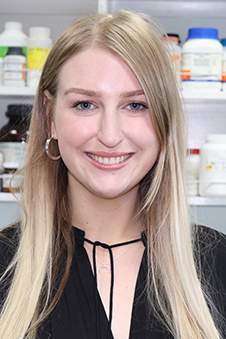Dr Janice Chew-Harris of the Translational Biodiscovery Lab and Evie Templeton, who is nearing the end of her PhD in the 'Omics Lab, have both been awarded Heart Foundation Research Fellowships.
 Dr Janice Chew-Harris
Dr Janice Chew-Harris
Fellowships provide much needed funding and help to kick-start or enhance a career. For Evie and Janice, the Heart Foundation Fellowship award provides $255,000 over three years and $251,783 over three years, respectively, and will allow them to each forge ahead in their research areas.
A suPAR biomarker
Inflammation is a key component underlying heart disease, which can complicate the behaviour of the disease and its treatment. Janice is investigating a blood marker known as suPAR, an inflammatory protein that has actions that are important in the evolution of atherosclerosis and in inflammatory dysfunction which may contribute to heart disease complexity. She has already found that increased amounts of suPAR in patients suspected of having acute heart failure to be highly predictive of worse outcomes.
Her Fellowship work will continue to build on those preliminary findings. The first goal is to determine whether suPAR levels are also altered in patients after a heart attack and whether it can be used to predict outcomes and guide treatment in those patients. “Additionally, my research will also determine whether suPAR itself may have a role on heart function. If it does, there may be a possibility of identifying a new therapy,” Dr Chew-Harris said, “I am very grateful to receive this Heart Foundation Fellowship. With this award, I can now take further steps towards achieving our main aim, which is to provide a new blood test to further assist clinicians in discerning who will gain from treatment, leading to improved outcomes.”
Building tools
Evie's Fellowship research focusses on the genetic links to heart health, aiming to identify those most likely to have poor outcomes after a heart attack. Heart attacks can change the shape, form and functioning of the heart chambers (known as adverse remodelling) and cause irregular heart rhythms - all of which increase the risk of heart failure, stroke and death.
 Evie Templeton
Evie Templeton
“I aim to develop new tools that will help identify patients who will subsequently have adverse remodelling or atrial fibrillation (the most common type of irregular heart rhythm) after a heart attack,” Evie said.
This information will allow Evie to build genetic risk scores and pin-point genetic pathways that lead to harmful remodelling and atrial fibrillation.
“By understanding the genes involved in these processes, we may be able to discover new therapeutic treatments and blood tests for heart patients. Beyond this research, the fellowship will support my transition from PhD student to Postdoctoral Research Fellow. I am very grateful to the Heart Foundation for this opportunity.”
